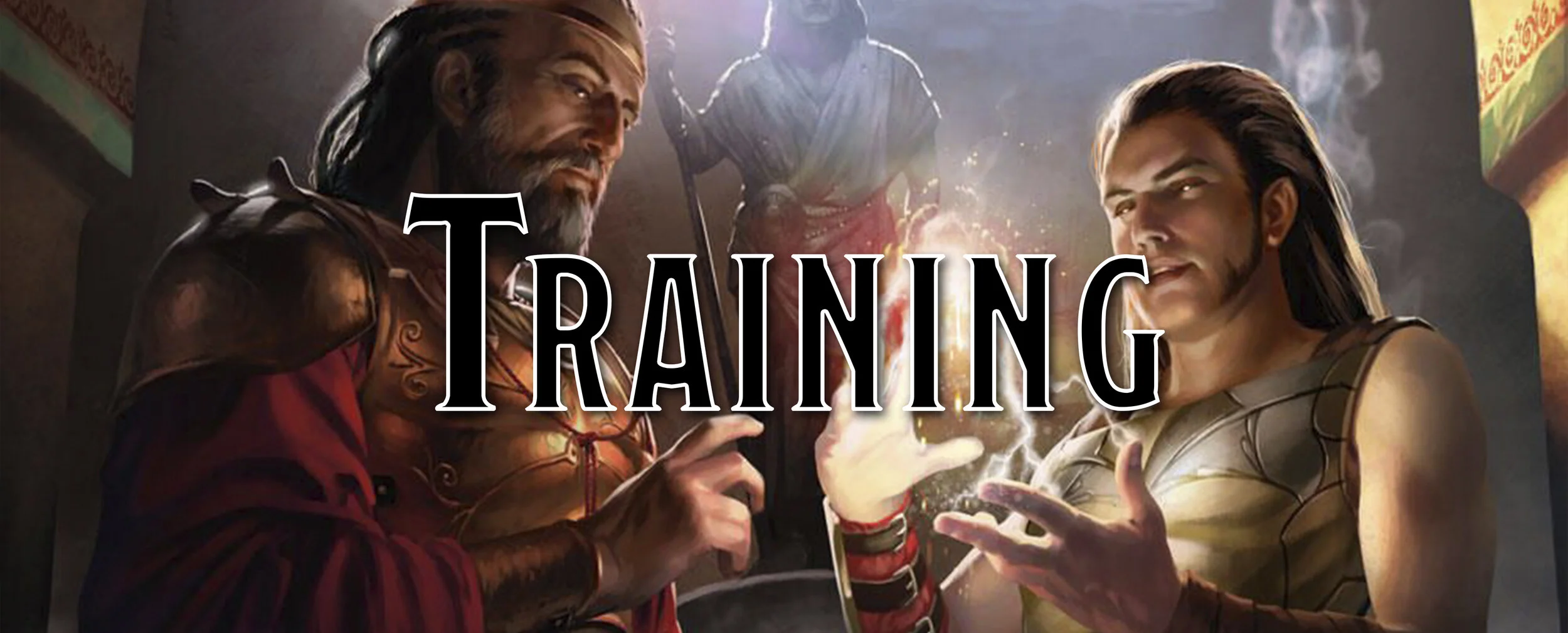Homebrew - Learning New Proficiencies
Characters rarely gain new skills and proficiencies as they go about their day-to-day lives while they adventure and risk their life. A character that goes into level 1 looks remarkably similar to what they look like at level 20, well… except for their ability to topple nations and summon massive balls of fire from the sky. If you ignore all that and squint really hard, they look the same. Trust me.
But the class features a character gains shouldn’t be the only thing a character picks up in their travels. Maybe they gain a new love for cooking, maybe they are in a new land and want to pick up the local language. Maybe they just love learning new things. Regardless of a character’s motivations, they are going to want to learn something new, at least so they have something to do in retirement once that dragon is stopped from eating all the knights and the damsels had to go in and save them.
For best results in GM Binder, use a Chrome Browser
Why This System?
Training can come in all forms and there are a variety of ways of doing it. WotC even provides their way in Xanathar’s Guide to Everything (2017) and it’s… well, it’s short and concise. So for some DMs, it’s probably perfect. It takes ten weeks, you can reduce the number of weeks based on your Intelligence modifier, and it costs 25 gp for each week. You now know everything there is to know about their system.
If that doesn’t exactly excite you, I don’t blame you. I had a player want to train for a new weapon and looking over those rules was pretty uninspiring. That’s not exciting to bring out to the table, there is no drama, there is no triumph! It is just… you punching a time card, paying a small fee, and then gaining the proficiency. Now, sure the DM could go out of their way and do lots of RPing with a trainer, have some complications arise, and bust their ass to make it exciting… except, at the end of it all, the character just puts a tick down to mark they accomplished a week of training… and there are 9 more weeks to go. At this point, the DM throws their hands in the air and the 9 weeks pass by in a snap because they have a game to run and a world to build and a story to weave. They don’t have time to spice up training and making it engaging.
… At this point, you probably know my opinion on the training montage that WotC provides.
Great, But Why Is This System Better? Just Answer The Question.
So, you know why I created my system. I was disappointed with the options provided, and frankly, I think Xanathar’s Guide to Everything gets far more credit for being a good sourcebook than it deserves. It has subclasses and spells, and that’s the only time I crack it open.
This system is an improvement for a variety of reasons.
It doesn’t require 10 weeks (minus your Intelligence modifier). Even if you take the absolute longest, you’ll be done in 1 to 8ish weeks.
Your Intelligence modifier only dictates how many additional proficiencies you can pick up, it is not the end all be all for determining the length of time. The rest of your ability scores dictate that - which makes this system more responsive to characters improving in places they are already good at.
There’s drama. Players get to roll dice and interact with the system. When they roll their die and gnash their teeth in frustration, there is more energy at the table than just watching a workweek float on by.
A bit more crunch. Not everyone likes rules that are more complicated than rolling a d20 and adding a number. Some people may like WotC’s ultra-simplistic take on training, others are looking for a bit more from their rules.
I want a fifth point because it seems more professional, but I’m just going to move on to the next section.
Training and How it Works
Now that you are on board, let’s go over the system and how it works.
Choose Your Proficiency
First, a player must determine what proficiency they are wanting to learn. I have limited it to Language, Skill, Tool, and Weapon proficiency. I was thinking of including Armor, but there are feats for that and I feel like Armor can get abused, so I included it as a variant rule.
Choose your Ability
Once they decide on what they want to train on, they must then figure out which ability correlates to it. Intelligence is in charge of language, Strength and Dexterity are for weapons, and then skills and tools will vary. Skills are based on the abilities assigned to it on the character sheet, so if you want to train Athletics, it will require Strength, if you want Medicine, it will require Wisdom.
Tools are a bit more complicated because WotC hasn’t provided a concrete list, but I have gone ahead and added a list of tools to the document of all the tools, plus the ones that Dump Stat have created, along with the ability scores I use for each one. This should be a handy chart that provides suggestions for DMs to lean on, though it isn’t written in stone. If you, and the character, think that having a proficiency in Mason’s Tools would be better as Intelligence instead of Strength, because all they want to be is an architect and not doing the hard work of laying bricks, then go for it!
Begin the Dice Rolls
We now have the proficiency the character wants, and we have the required ability. What they now must do is spend 4 hours a day practicing their new language/skill/tool/weapon, and then they get to roll their Proficiency Check. This starts as a d20, and every time you roll a 1, it decreases in size to the next die.
BUT! This is further augmented by the ability we chose in the previous step. See, I think that a really wise character should have an easier time of learning to medicine than some dumbass with a sword who keeps not seeing those super obvious traps that have signs hanging from them that read, “TRAP! DON’T STEP HERE!”
If a character has a modifier for their ability that corresponds to the new proficiency they are training in, their initial Proficiency Check doesn’t use a d20. Instead, it is assumed that they have automatically made progress because they have a basic understanding of it due to their natural abilities. They make progress a number of times equal to their modifier, this means that if a Cleric has a +3 Wisdom, they’d have succeeded automatically on their Proficiency Check three times!
This would reduce their Proficiency Check die from a d20, to a d12, then to a d10, and finally a d8. When they spend their 4 hours and roll their Proficiency Check, they would then roll that d8, instead of the previous d20, and on a 1, they make progress and swap out a d8 for a d6.
Being good at a relevant ability should encourage characters to learn new and better proficiencies, to be improving who they are as characters throughout a campaign.
Success and Gaining a Proficiency
But, we aren’t done yet. Once a character has gotten down to the smallest die size, a d4, and rolls a 1, they are not immediately proficient in the ability. Instead, they mark a success and must continue training. A character needs a number of successes on a d4 equal to their Proficiency Bonus. This helps with the idea that, as a character levels up, their knowledge and proficiency increases and it is much harder for a level 20 character to include their Proficiency Bonus on a check than it is for a level 1 character to do so.
For our cleric, they have a +2 Proficiency Bonus, this means they need to roll a 1 on their d4 twice so that they are fully and completely proficient with their Medicine skill. If they had a +6 Proficiency Bonus, it would require them to roll a d4 and get a result of 1 six times to be proficient enough to add their bonus to the Medicine skill.
Training Costs
But that’s not all. WotC charges you money, and I understand that. It costs money to get into a library and to hire trainers and to get supplies. If you don’t wish to hire and trainer and simply want to make it out on your own, you can do that and it simply costs you 2 gp per day of work.
If you want a trainer, because they provide some benefits to your training, the cost of a trainer is based on the DM’s discretion, though I do provide a chart with some suggestions. A trainer can cost anywhere from 2 gp per day to 10 gp and beyond.
Finishing Up Training
Those are the basics of my training system, it is straightforward, it allows characters to gain proficiencies even if their intelligence isn’t great, and provides a way for you to use downtime days in your campaigns. There are a few small rules in the document I didn’t go over, but the basics are here.
This is simply made to provide drama (with die rolls), provide customization for a character, and bring a bit more excitement to the table then marking another tick on a tally and just wishing the 10 weeks of training would end. I hope you enjoy it and can put it to some good use.
If you want a printer-friendly PDF of this homebrew, or any other homebrew or tool we’ve made, consider supporting us at the $1 tier on our patreon! All hombrew that I’ve created or will create in the future will be uploaded to our patreon in printer-friendly versions. We appreciate any and all support!
Like what we are doing here?
Support us on Patreon!
You’ll get early access to deep dives, our Homebrew Hoard, our extras podcast and more!
Follow us on Twitter to keep up to date on everything we talk about!




